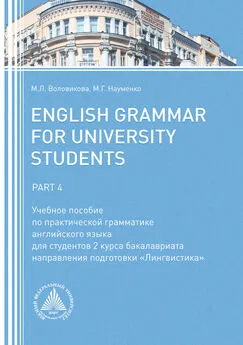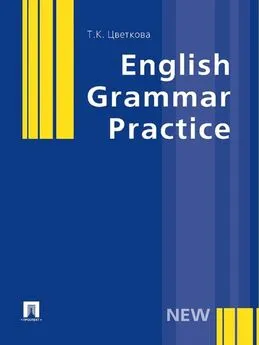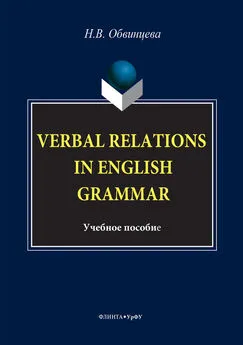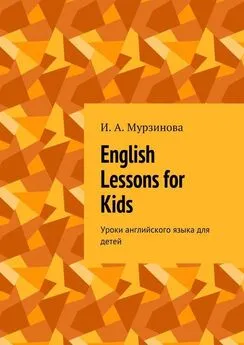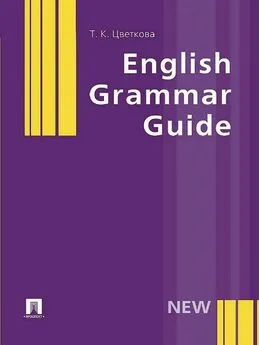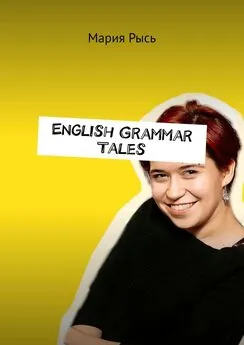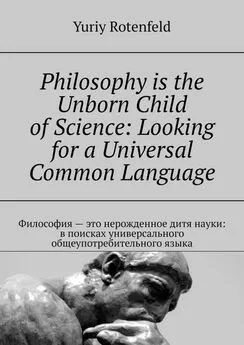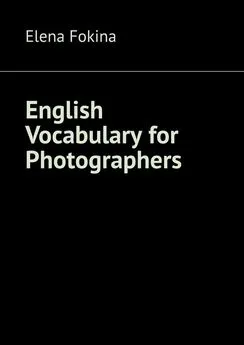Марина Науменко - English Grammar for University Students. Part 4
- Название:English Grammar for University Students. Part 4
- Автор:
- Жанр:
- Издательство:неизвестно
- Год:неизвестен
- ISBN:9785927526390
- Рейтинг:
- Избранное:Добавить в избранное
-
Отзывы:
-
Ваша оценка:
Марина Науменко - English Grammar for University Students. Part 4 краткое содержание
English Grammar for University Students. Part 4 - читать онлайн бесплатно ознакомительный отрывок
Интервал:
Закладка:
1. The Non-Perfect (Indefinite, Simple) Infinitive denotes an action simultaneous with that of the finite verb.
Jeremy likes to write letters.
Jeremy liked to write letters.
Jeremy will like to write letters.
2. The Continuous Infinitive expresses an action in progress or happening over a period of time and simultaneous with that of the finite verb. The Continuous Infinitive is both a temporal and aspect form, becauseit expresses how an action, denoted by the Infinitive, extends over time.
You must be joking.
I happened to be waiting for the bus when the accident happened.
3. The Perfect Infinitive denotes an action prior to that of the finite verb.
Lucy was known to have left the day before.
I am happy to have finished school.
If you had run faster you would have won the race.
4. The Perfect Continuous Infinitive denotes an action in progress or happening over a period of time which is prior to that of the finite verb. The Perfect Continuous Infinitive is both a temporal and aspect form,because it expresses how an action, denoted by the Infinitive, extends over time.
I’m glad to have been living in Barcelona for the last ten years.
But for the fog the travellers would have been wandering in the forest for a long time.
The Infinitive of transitive verbs possesses voice distinctions and has the forms of the Active and Passive Voice.
Please remember to bring a mat and a towel with you to the next aerobics class (Indefinite Active).
He happened to be brought up in a very rich family (Indefinite Passive). President Trump is very proud to have brought the subject of illegal immigration back into the discussion (Perfect Active).
Tomatoes are known to have been brought to Europe in the XVI thcentury (Perfect Passive).
The active form of the Infinitive shows that the subject of the sentence, the person or thing characterised by the Infinitive, or the person or thing expressed in the Infinitive predicative construction is the doer of the action denoted by the Infinitive.
The passive form of the Infinitive shows that the subject of the sentence, the person or thing characterized by the Infinitive, or the person or thing expressed in the Infinitive predicative construction is affected by the action denoted by the Infinitive [Шрамко, Степанова, Кожемяка, 2008].
The use of the infinitive without the particle to (the bare infinitive)
The Infinitive is used without the particle to in the following cases:
1. After auxiliary verbs.
Do you like music?
Seldom do we witness such catastrophes.
Does anyone know where I left my diary?
2. After modal verbs (except ought to) and modal expressions had better, would rather, would sooner.
You must use some verbs more than once.
We’d better not borrow Diane’s books without asking her.
She’d sooner die than give up.
3. After verbs of sense perception (see, notice, watch, observe, hear, feel, smell, etc.) as a part of the Objective Infinitive Construction.
I watched him arrive.
We noticed her runaway from the building .
Note, that in passive sentences with these verbs a to-Infinitive is used.
He was watched to arrive.
He was noticed to run away from the house.
4. After verbs of inducement (let, make, have) as a part of the Objective Infinitive Construction.
I made Peterwait outside.
John lets the dog sleepon the sofa.
But! Peter was made to wait outside.
5. After phrases with but (cannot but, anything but, nothing but).
I could not but congratulate him.
She can do everything but cook.
6. In why-sentences, both affirmative and negative, where it expresses a suggestion.
Why not take advantage of the situation?
Why go there so late?
Why make so much noise?
7. In cases when two Infinitives are joined by ‘and’ or ‘or’, bare Infinitive can be used.
I want to go out and have fun and relax.
Syntactical functions of the infinitive
The Infinitive may be used in a number of syntactical functions in which it may stand alone, form an Infinitive phrase or a predicative construction.
1. Subject
Non-perfect active forms are more widely used in this function.
To speak foreign languages well is an advantage.
To have got the job in the face of such stiff competition was a great achievement.
The subject expressed by the Infinitive may be introduced by the so-called introductory it , which stands at the beginning of the sentence.
It is sometimes difficult to accept the truth.
It may be advisable to consult a specialist.
The Infinitive is a part of a complex subject as a part of the Subjective Infinitive Construction.
He was seen toenter the room.
1. Part of the predicate
The Infinitive is used in predicates of several types, both nominal and verbal.
a) Predicative (part of a compound nominal predicate)
My dream is to travel around the world.
Sometimes doing the right thing is to do nothing at all.
b) Secondary predicative (part of a predicative)
She is easy to deal with.
He is nice to talk to.
The house is comfortable to live in.
In this function the action expressed by the Infinitive is aimed at the subject.
c) Part of a compound verbal predicate
The Infinitive is used i n a compound verbal modal predicateafter modal verbs, modal expressions, and verbs with modal meaning.
Do you really have to leave so early?
I am willing to go to the theatre with you.
Jane likes to fish.
The Infinitive serves as a part of a compound verbal aspect predicateafter verbs denoting beginning, continuation, repetition or cessation of the action. These verbs are to begin, to come, to start, to continue, to go on, etc.
Schoolchildren begin to study at half past eight.
We used to go swimming every evening when in Nice.
At the next lesson the teacher went on to explain the functions of the Infinitive.
The above mentioned verbs can also be used with a Gerund, although with a certain difference in meaning.
For example, the verb to stop + Gerund means to finish an action, to interrupt, as for to stop + Infinitive , it means to make a pause in order to do something. That is why the Infinitive after the verb to stop is used in the function of an adverbial modifier of purpose.
He stopped smoking for health reasons.
He stopped to rest for a few minutes
Go on + Gerund means to continue with the action. Go on + Infinitive means to do the next action, or change the activity.
He went on speaking for two hours.
After her early teaching career she went on to become a doctor.
3. Object
Most commonly used verbs followed by the Infinitive are the following: afford, agree, aim, appear, arrange, bother, care, claim, consent, decide, demand, determine, fail, guarantee, hesitate, hope, learn, manage, offer, prepare, pretend, proceed, promise, propose, refuse, resolve, seek, strive, swear, threaten, trouble, undertake, volunteer, vow.
The Infinitive may also be used as an object after an adjective. The most commonly occurring of them are: amazed, delighted, lucky, relieved, afraid, disappointed, sad, anxious, determined, shocked, ashamed, eager, pleased, astonished, fortunate, prepared, surprised, careful, glad, proud, sorry, certain, happy, ready, upset, content, hesitant, reluctant, willing, pleased, inter ested, etc.
Note: Sometimes the introductory object it is used.
He found it difficult to spot her in the crowd.
4. Attribute
The Infinitive in this function may modify nouns, substantivized adjectives, pronouns, numerals.
This is much to ask.
England, once «the workshop of the world», was the first to become a highly developed industrial country.
Hope is the last to die.
When we go out, he’s always the one to pay.
5. Adverbial modifier
The Infinitive can be used as an adverbial modifier of purpose, subse quent events, consequence, attendant circumstances, comparison, condition, exception, time, cause, or motivation [Кобрина, Корнеева, 2009].
A dverbial modifier of purpose.Indefinite forms of the Infinitive (both active and passive) are used in this function. The Infinitive may be preceded by the conjunction in order, so as or by limiting particle (just, only):
We all need stress in order to achieve and do our best work.
They never parked the big van in front of the house so as not to upset the neighbours.
Adverbial modifier of subsequent events or attendant circumstances.In this function the Infinitive denotes an action that follows the one denoted by the predicate. The Infinitive may be preceded by the particles only, merely, simply [Н. А. Кобрина, Е. А. Корнеева и др., 2009].
He left his home town, never to come back.
I tore open the box, only to discover that some of the parts were missing. I went to see the doctor, only to find him absent.
Adverbial modifier of result.In this function the Infinitive is used after adjectives and adverbs modified by too ; enough ; so …. as , and nouns modified by such.… as.
I was too afraid to try bungee jumping.
No man is clever enough to know all the evil he does.
Would you be so kind as to send to me those documents?
Trade policy needed to be organized in such a way as to contribute to sustainable economic development.
Adverbial modifier of comparison or manner.In this function the Infinitive is introduced by the conjunctions as if, as though or than .
Читать дальшеИнтервал:
Закладка:
